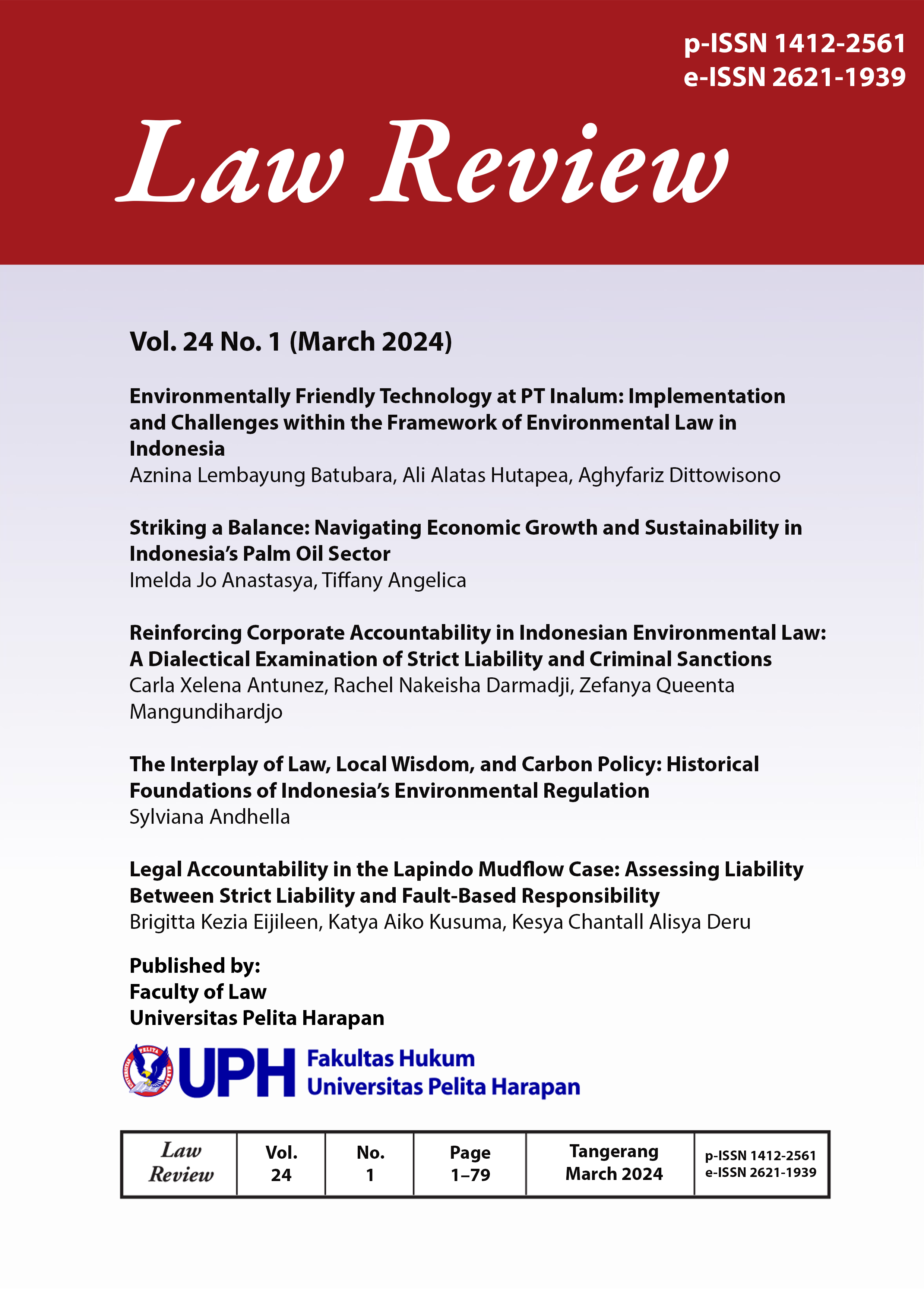Environmentally Friendly Technology at PT Inalum: Implementation and Challenges within the Framework of Environmental Law in Indonesia
DOI:
https://doi.org/10.19166/lr.v24i1.9737Kata Kunci:
Environmentally Friendly Technology, Environmental Law, Sustainability PolicyAbstrak
Environmental-friendly technology plays a crucial role in modern industries, including PT Inalum, a leading aluminum producer in Indonesia. The company has implemented various innovations to minimize environmental impacts, such as utilizing renewable energy sources, waste management systems, and emission reduction technologies. These efforts aim to comply with national environmental regulations, such as Law Number 32 of 2009 on Environmental Protection and Management, and international commitments like the Paris Agreement 2016. This study examines the challenges faced by PT Inalum in implementing sustainable technology. The research employs normative legal analysis and case study methods, focusing on regulatory reviews and corporate sustainability practices. Key challenges include regulatory uncertainty, overlapping government policies, and weak law enforcement mechanisms. Additionally, high investment costs for green technology adoption pose a significant barrier to achieving optimal environmental sustainability. The findings indicate that despite PT Inalum’s commitment to environmentally friendly practices, legal and economic obstacles hinder full regulatory compliance. The study suggests the need for clearer policies, stronger enforcement mechanisms, and financial incentives to encourage sustainable industrial transformation. Enhanced collaboration between government authorities and industry stakeholders is essential to creating a more effective and efficient sustainability framework.
Referensi
Laws and Regulations
Republic of Indonesia Law Number 32 of 2009 on Environmental Protection and Management.
Republic of Indonesia Government Regulation Number 22 of 2021 on Environmental Protection and Management Implementation.
Minister of Environment and Forestry of the Republic of Indonesia Regulation No. 15 of 2019 on Industrial Emission Standards.
Books
Bappenas. Integrasi Kebijakan Sektor untuk Mendukung Transisi Ekonomi Hijau di Indonesia. Jakarta: Bappenas, 2023.
Bappenas. Rencana Pembangunan Jangka Panjang Nasional (RPJPN) 2005–2025 dan Pembaruan Arah Pembangunan Jangka Panjang Berkelanjutan. Jakarta: Bappenas, 2020.
Bappenas. Roadmap Inovasi Teknologi Lingkungan 2023–2045. Jakarta: Bappenas, 2023.
European Aluminium Association. Sustainability Roadmap for the Aluminium Industry in Europe. Brussels: EAA, 2020.
International Aluminium Institute (IAI). Aluminium Carbon Footprint Technical Support Document. London: IAI, 2021.
Kementerian Lingkungan Hidup dan Kehutanan. Kajian Implementasi Prinsip Ekonomi Sirkular di Sektor Industri. Jakarta: KLHK, 2022.
Kementerian Pendidikan, Kebudayaan, Riset dan Teknologi. Program Kampus Merdeka: Inovasi Hijau dan Kemitraan Industri. Jakarta: Kemdikbudristek, 2023.
Kementerian Perindustrian. Peta Jalan Industri Hijau Nasional 2022–2030. Jakarta: Kementerian Perindustrian, 2022.
Ministry of Environment and Forestry of the Republic of Indonesia. Performance Report on Industrial Environmental Management in Indonesia. Jakarta: KLHK, 2022.
OECD. Green Growth Policy Review of Indonesia. Paris: OECD Publishing, 2021.
OECD. Incentives for Green Innovation: A Toolkit for Developing Countries. Paris: OECD Publishing, 2021.
United Nations Environment Programme (UNEP). Global Environment Outlook 6: Healthy Planet, Healthy People. Nairobi: UNEP, 2019.
United Nations Industrial Development Organization (UNIDO). Green Industry Platform: A Global Initiative to Advance Sustainable Industrialization. Vienna: UNIDO, 2022.
World Bank. State and Trends of Carbon Pricing 2020. Washington DC: World Bank, 2020.
World Economic Forum. Public-Private Collaboration for Green Industrial Transformation. Geneva: WEF, 2021.
Journal Articles
Anderson, R., and A. Wicaksono. “Social License to Operate and Indigenous Rights in Resource-Dependent Regions of Indonesia.” Asia Pacific Journal of Environmental Law 22, no. 3 (2019): 187–204.
Fatimah, N. “Legal Uncertainty in Environmental Licensing in Indonesia: The Clash between Central and Regional Authority.” Journal of Law and Policy Reform 12, no. 3 (2019): 89–102.
Mulyono, A. T., and R. K. Karo. “Questioning a Fair Settlement as the Legal Resolution of Global Interests.” IOP Conference Series: Earth and Environmental Science 1270 (2023): 012025. https://iopscience.iop.org/article/10.1088/1755-1315/1270/1/012025.
Nurhidayat, R., and A. Prasetyo. “Evaluasi Sanksi Administratif terhadap Pelanggaran Lingkungan di Indonesia.” Jurnal Hukum Lingkungan 5, no. 2 (2021): 133–148.
Sari, R. P., and F. Hutagalung. “Public Participation in Environmental Impact Assessment (AMDAL) Process in Indonesia: Legal Reality and Practice.” Journal of Environmental Policy and Law 17, no. 1 (2020): 102–115.
Sihombing, R. “Community Engagement in Resource Extraction Zones: The Case of North Sumatra.” Journal of Regional Development 19 (2021), no. 2: 45–60.
Suryadi, A. “Weak Enforcement in Indonesian Environmental Law: Institutional and Structural Barriers.” Indonesian Journal of Environmental Law 6, no. 1 (2020): 45–60.
TMs Journals. “Review on Global Environmental Agreements and Legal Frameworks in Sustainable Development.” International Journal of Environmental Law (2023).
International Agreements
Regional Cooperation on Green Technology and Circular Economy in ASEAN 2023.
Kyoto Protocol to the United Nations Framework Convention on Climate Change 1997.
Paris Agreement to the United Nations Framework Convention on Climate Change (UNFCCC) 2016.
Website Content
ASEAN. “From Recovery to Resilience: The Development Response to COVID-19 in East Asia.” 2021. https://asean.org/wp-content/uploads/2024/05/The-ASEAN-Issue-No.-37_-From-Recovery-to-Resilience-1.pdf.
PT Indonesia Asahan Aluminium (Inalum). “Laporan Keberlanjutan 2022.” Accessed September 17, 2025. https://www.inalum.id/id/esg/hubungan-investor/laporan-berkelanjutan.
United Nations. “Sustainable Development Goal 12: Ensure Sustainable Consumption and Production Patterns.” Accessed September 17, 2025. https://sdgs.un.org/goals/goal12.
Unduhan
Diterbitkan
Cara Mengutip
Terbitan
Bagian
Lisensi
Hak Cipta (c) 2025 Aznina Lembayung Batubara, Ali Alatas Hutapea, Aghyfariz Dittowisono

Artikel ini berlisensi Creative Commons Attribution-NonCommercial 4.0 International License.
Authors who publish with this journal agree to the following terms:
1) Authors retain copyright and grant the journal right of first publication with the work simultaneously licensed under a Creative Commons Attribution License (CC-BY-SA 4.0) that allows others to share the work with an acknowledgement of the work's authorship and initial publication in this journal.
2) Authors are able to enter into separate, additional contractual arrangements for the non-exclusive distribution of the journal's published version of the work (e.g., post it to an institutional repository or publish it in a book), with an acknowledgement of its initial publication in this journal.
3) Authors are permitted and encouraged to post their work online (e.g., in institutional repositories or on their website). The final published PDF should be used and bibliographic details that credit the publication in this journal should be included.





